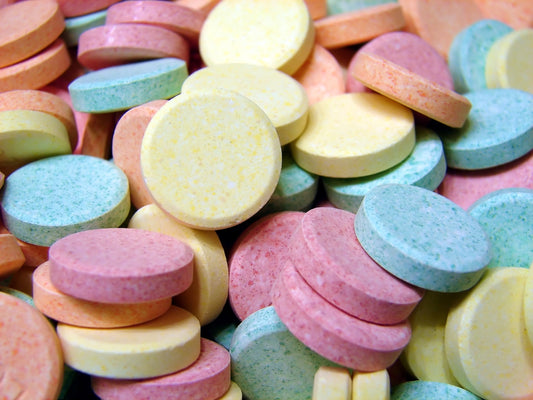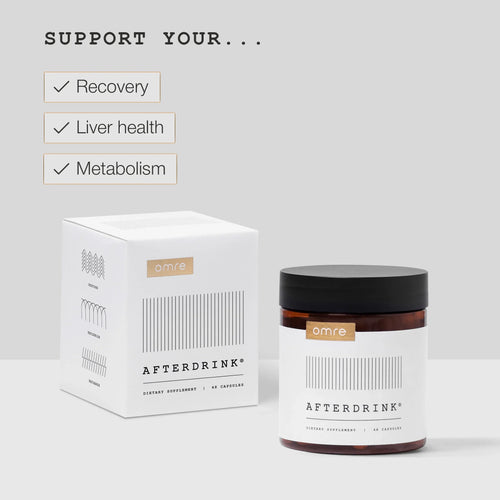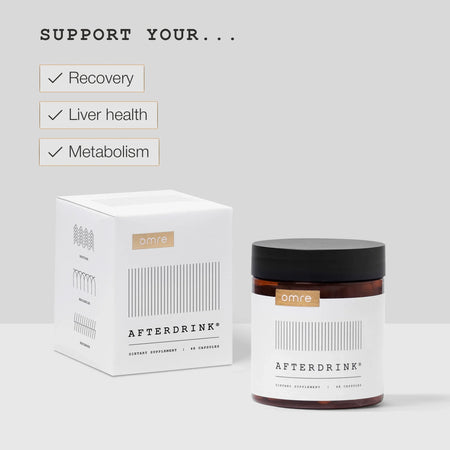Table of Contents
- HOW DO TUMS WORK, AND WHAT ARE THEY USED FOR?
- DO TUMS INTERACT WITH ALCOHOL?
- CAN YOU TAKE TUMS AFTER DRINKING ALCOHOL?
- DO TUMS HELP WITH HANGOVERS?
- DO TUMS PREVENT HANGOVERS?
- DO TUMS HELP WITH AN UPSET STOMACH AFTER ALCOHOL?
- DO TUMS HELP WITH NAUSEA FROM ALCOHOL?
- ANYTHING ELSE TO CONSIDER?
- TUMS AND ALCOHOL – FINAL WORDS
Can you take Tums after drinking alcohol? Do tums help with hangovers? If you’ve landed on this page, chances are you’re not feeling too great and looking for a potential remedy for your hangover woes.
Tums are one of the most popular antacid brands in the US and are sold over the counter in stores and pharmacies around the country.
You may be wondering whether taking tums interacts with alcohol. Or even whether tums can be beneficial for hangovers.
In this article, we aim to clear things up by taking a closer look at everything you need to know.
Afterdrink®
A supercharged antioxidant designed to support recovery, made from the very best, research-backed ingredients on the market.*
HOW DO TUMS WORK, AND WHAT ARE THEY USED FOR?
As you probably know, Tums is an antacid. Its primary use is to settle symptoms of indigestion, also known as "heartburn."
The active ingredient is calcium carbonate, which helps neutralize stomach acid.
Many different types of antacids are available on the market, and they all work slightly differently. Tums would be on the weak side of the spectrum in terms of how well they neutralize stomach acid.
Calcium carbonate-based antacids in the UK are not routinely used for this purpose. (1)
With the basics out the way, let's focus on all things tums and alcohol-related.
DO TUMS INTERACT WITH ALCOHOL?
A drug interaction is a change in the action or side effects of a drug caused by taking it with something else, such as food, beverage, supplement, or another drug.
The active ingredient in tums, calcium carbonate, does not interact with alcohol.
So, in theory, there shouldn't be a problem with taking tums if you've been drinking alcohol. That said, everyone is different and may experience adverse effects.
IS IT SAFE TO TAKE TUMS WHILE DRUNK?
Yes, it is generally safe to take Tums while drunk, as they do not interact with alcohol. However, it’s important to use them as directed and avoid overuse, especially if experiencing severe symptoms.
CAN YOU TAKE TUMS AFTER DRINKING ALCOHOL?
Yes, you can take Tums after drinking alcohol if you're experiencing heartburn symptoms. Tums can help neutralize stomach acid and provide relief. However, they are not intended to prevent heartburn when taken before or during alcohol consumption.
If you've had a few drinks and heartburn is kicking in, Tums can offer some relief. Heartburn after drinking alcohol is quite common, and here’s why: alcohol relaxes the muscles in your lower esophagus, making it easier for stomach acid to splash back.
It also increases stomach acid production and can inflame the lining of your stomach. (2)
On top of that, alcohol is dehydrating, which doesn’t just contribute to your heartburn but can also worsen other hangover symptoms like headaches and dizziness.
While Tums can be effective for addressing these issues after the fact, manufacturers advise against using them as a preventative measure before or during drinking. (3)
Their purpose is to neutralize stomach acid, not to stop it from forming in the first place.
In summary, Tums are a safe and effective option for heartburn relief after drinking, but they won’t prevent alcohol-related symptoms if taken preemptively. Always use them as directed and consult a healthcare provider if symptoms persist.
DO TUMS HELP WITH HANGOVERS?
Yes, Tums can help with hangovers by relieving symptoms like nausea, heartburn, and abdominal pain caused by increased stomach acid from alcohol. However, Tums do not address the primary causes of hangovers, such as dehydration and low blood sugar. Rehydration is essential for alleviating other hangover symptoms.
DO TUMS PREVENT HANGOVERS?
No, Tums do not prevent hangovers. While they may provide relief from acid reflux or heartburn, they do not address the root causes of a hangover, such as dehydration, acetaldehyde buildup, or disrupted sleep.
Many people wonder if taking Tums before drinking alcohol can help prevent a hangover. Unfortunately, this is a myth.
Hangovers result from a combination of factors, including alcohol-induced dehydration, low blood sugar, inflammation, and the accumulation of acetaldehyde—a toxic byproduct of alcohol metabolism.
Tums, as an antacid, only neutralize stomach acid and are designed to address heartburn and indigestion. They have no effect on the other physiological processes that lead to hangover symptoms.
If you’re looking to prevent hangovers, the best approach is to pace your drinking, consume alcohol in moderation, stay hydrated, and eat before drinking.
Tums might help if heartburn is part of your hangover, but they won’t prevent the overall discomfort of a hangover itself.
Afterdrink®
A supercharged antioxidant designed to support recovery, made from the very best, research-backed ingredients on the market.*
DO TUMS HELP WITH AN UPSET STOMACH AFTER ALCOHOL?
Tums can help with an upset stomach caused by indigestion or acid reflux after drinking alcohol by neutralizing stomach acid. However, they are unlikely to provide relief for other alcohol-related stomach issues, such as abdominal pain or diarrhea.
DO TUMS HELP WITH NAUSEA FROM ALCOHOL?
Tums may help with nausea caused by acid reflux or indigestion after drinking alcohol, as they neutralize stomach acid. However, they are unlikely to address nausea caused by dehydration or the toxic effects of alcohol metabolism.
ANYTHING ELSE TO CONSIDER?
Suppose you're experiencing indigestion, heartburn, or any stomach upset. Before taking any medication, it is best to always speak to your pharmacist or doctor for advice.
At the same time, if you're taking Tums regularly and still experiencing symptoms, it's time to seek expert help.
It's also important to note that common hangover remedies like greasy foods or "hair of the dog" (drinking more alcohol the following day) won't cure a hangover and might only provide you with temporary comfort. Neither addresses the physiological causes of hangovers, just like Tums only offers relief for specific symptoms.
Trying to remedy any of the adverse effects of alcohol with Tums is not the ideal approach. The best way to prevent adverse effects from drinking alcohol is to reduce how much you're drinking.
If you do drink alcohol, rehydrating with water and replenishing your lost electrolytes is essential for your recovery. For severe hangovers, some people turn to IV therapy, although its effectiveness against hangovers is debatable.
Furthermore, the type of alcohol you're drinking could also be the source of your problems—for example, intolerances to gluten or congeners in alcohol. You can find out more about this in our article about bloating after drinking alcohol.
TUMS AND ALCOHOL – FINAL WORDS
That brings us to the end of our look into all things related to tums and alcohol.
In summary, taking Tums will:
– Help with acid reflux/heartburn/indigestion
– It does not "interact" with alcohol
– Will not prevent or treat a hangover beyond relieving heartburn
Suppose you are experiencing symptoms after drinking alcohol. In that case, it's always best to speak to your doctor before assuming your symptoms are related to a specific medical problem. After all, that's what they are there for!





